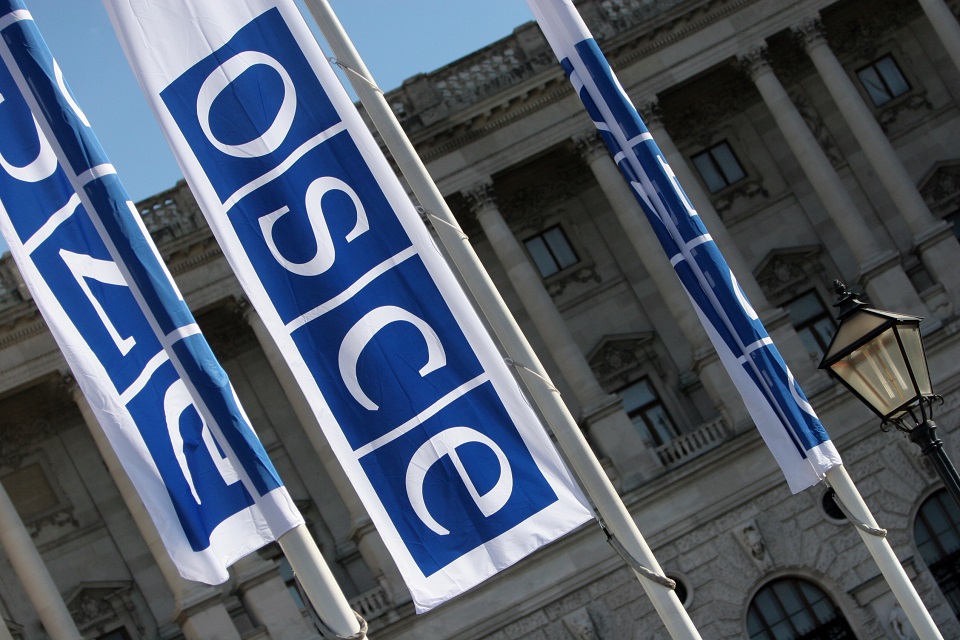Special OSCE meeting on the situation in and around Ukraine: UK statement
On behalf of the UK, Ambassador Neil Bush shares Ukraine’s significant concerns about the current situation and calls on Russia to comply with OSCE commitments.

Thank you Mr Chair for convening this Special Permanent Council meeting today. And thank you to Chief Monitor Cevik and Special Representative Kinnunen for their updates. We remain strong supporters of the Special Monitoring Mission and its impartial approach as the international community’s eyes and ears on the ground. We are also grateful for the valuable role of the Trilateral Contact Group in supporting the implementation of the Minsk Agreements.
We are entering an increasingly dangerous period. Russia military build up in and around Ukraine is the largest deployment on the European continent since the end of the Cold War. This is not just ‘unusual’. It is threatening and dangerous to Ukraine, and a challenge to global security and the international order.
Rather than act on its stated commitment to dialogue, Russia is instead showing contempt for the OSCE commitments it has freely signed up to.
It has boycotted every meeting that Ukraine has called under Chapter Three of the Vienna Document (PDF, 115 KB). Extraordinarily, given the context I have just set out, it is Russia that has accused Ukraine of provocation. Every step of the way, Russia has obfuscated, distracted and delayed.
This is in stark contrast to the approach taken by Ukraine. In the face of highly provocative actions by Russia, Ukraine has made massive diplomatic efforts to reduce tension. Ukraine has continued to engage constructively in the Normandy Format and the Trilateral Contact Group. Ukraine repeatedly continue to ensure the Special Monitoring Mission’s ability to monitor in government-controlled areas, unlike Russia’s proxies who systematically attempt to restrict the Mission’s movement.
Here in Vienna, Ukraine has welcomed the Polish Chair’s initiative to hold the Renewed European Security Dialogue. Ukraine has welcomed the early warning issued by the OSCE Secretary General and expressed readiness to consider further OSCE action to reduce tensions. Ukraine has used the OSCE Vienna Document processes to share its concerns and given Russia the opportunity to answer questions on its unusual military activity.
If the Kremlin is serious about a diplomatic resolution then it needs to engage properly and commit to meaningful talks at the OSCE.
Mr Chairman, we share the deep concern expressed by Chairman-in-Office Rau and Secretary General Schmid about the significant increase in armed violence in eastern Ukraine. In its 18 February report, the SMM reported almost 900 ceasefire violations, including over 600 explosions. On 19 February this figure had risen to over 1500 ceasefire violations, the overwhelming majority of which were explosions. We condemn the use of heavy weaponry and indiscriminate shelling of civilian areas, which constitute a clear violation of the Minsk Agreements.
We note that the vast majority of weapons in violation of withdrawal lines observed by the SMM are in non-government controlled areas and that the Mission reported a significant increase in the number of heavy weapons observed in training camps belonging to Russia-backed armed formations in November and December compared to September and October.
We welcome the efforts of Ambassador Kinnunen to convene an extraordinary meeting of the Trilateral Contact Group and in effort to address this worrying escalation. We regret that Russia and its proxies chose again to boycott.
We must ask ourselves why? Why, if separatist leaders fear for their security will they not engage in dialogue? Why, if Russia believes Ukraine is preparing for an offensive will it not engage in dialogue?
Because they do not want transparency. They do not want to engage in risk reduction. Instead, they want to continue to wage a disinformation campaign intended to destabilise and create a false pretext for an invasion of Ukraine.
We need look only at the measures taken on 18 February by the self-proclaimed ‘People’s Republics’. Separatist leaders claimed they were facing an imminent attack from Ukraine. They took to the airwaves to order ‘emergency’ evacuations. But independent experts from multiple countries have since confirmed that metadata attached to the videos prove they were recorded on 16 February.
The UK and its partners have identified more than 70 different such ‘provocation’ stories disseminated by Russian state-controlled sources since the beginning of February. The amount of disinformation these sources pump out has doubled in the last week alone. We must all collectively remain alert and exercise extreme caution regarding any such reporting in the coming days.
Mr Chairman, the UK underlines its continued support for Germany’s and France’s efforts through the Normandy Process to secure the full implementation of the Minsk Agreements. We welcome public statements by President Zelenskyy underlining Ukraine’s firm commitment to the Minsk Agreements and his readiness to contribute constructively to the process.
We call on Russia to seize the opportunity which Ukraine’s proposals represent for the diplomatic path. We also call again for Russia to engage seriously with the Renewed European Security Dialogue, and the offers of talks in the NATO-Russia Council and the US-Russia Strategic Stability Dialogue.
Russia should be in no doubt that if it chooses an alternative path of further military aggression against Ukraine, there will be massive consequences, including financial and economic sanctions on a wide array of sectoral and individual targets that would impose severe and unprecedented costs on the Russian economy. As G7 Foreign Ministers made clear on 18 February, we will take coordinated restrictive measures in case of such an event.
Mr Chairman, Russia still has a choice. It can disregard the UN Charter and Helsinki Final Act, and face the bloody economic and political costs of waging a war against Ukraine. Or it can choose to match its words with actions, withdraw its troops, engage in meaningful talks and act in the best interests of peace, security and stability in Europe. We urge it to take the path of dialogue and diplomacy.